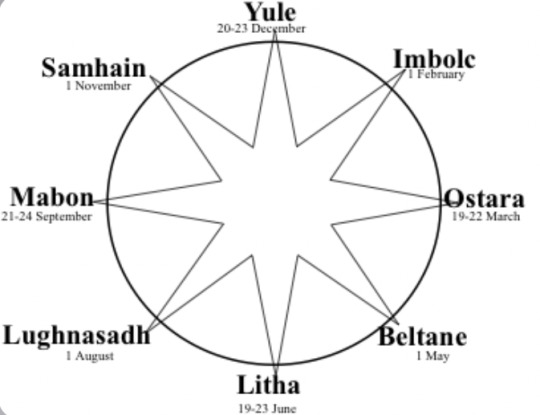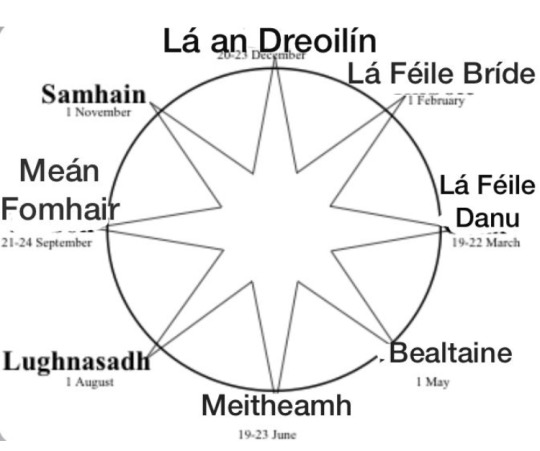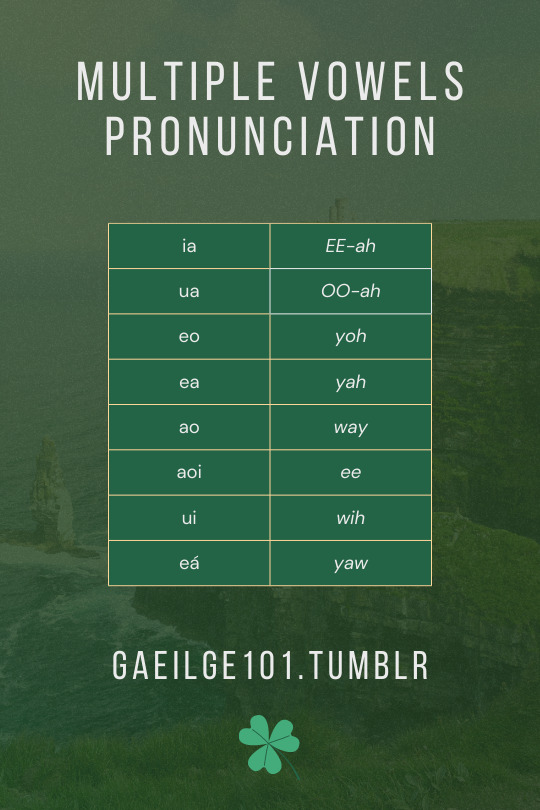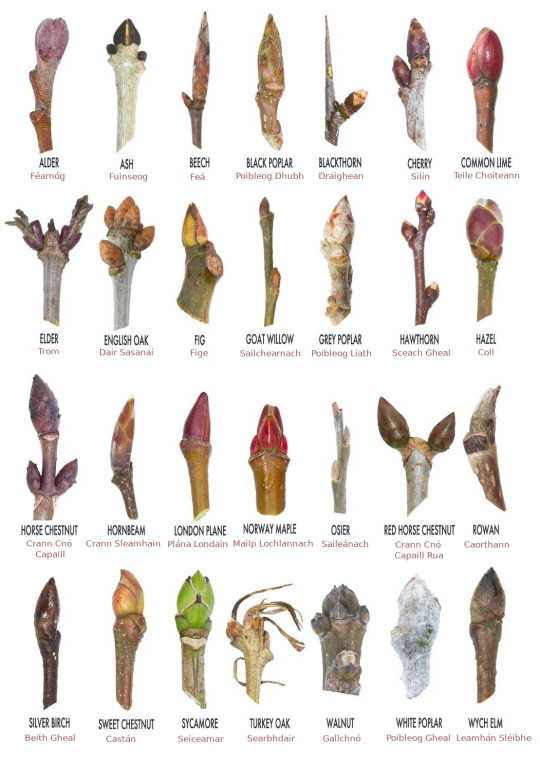Text
LGBTQ+ terminology - as Gaeilge ☘️🌈
Now, pardon me, but before I get to the meat of this post, the LGBTQ+ stuff, which is what I know we're all looking for 😁 I gotta do a little rant first
😌🙏😙💨
While I deeply appreciate the efforts of several groups over the last couple of years to translate English-language terminology and understanding of gender and sexuality, and the digression and non-conformity belonging thereto, I believe that, ultimately, it's a placeholding wedge-in that contributes to the wider problem of Anglicisation, or more accurately "Béarlachas", as it affects the Irish Gaelic language.
(Yes, I do be calling the language Gaelic - No, I am not American. I have a reason for doing so which I'll elaborate on in another post*.)
Now, Béarlachas is *not* borrowing and loaning words from English and using them seamlessly in Irish - a thiarcais, Irish speakers have been under the yoke of that language for over nine-hundred years, stating that we cannot adopt and adapt its words to our language is tone policing and language oppression of minority language speakers at it finest 🤌.
No, "Béarlachas" is the enforcement of the English-language thought process onto Irish. It comes from a place where thinking that English is more advanced, and has developed ways of understanding, and assuming that no other language, or in this case, Irish, has not caught up, or needs to rely on English.
You can see how this is a problem, right?
Queer people have always been everywhere. People distorting gender and sexuality norms have always been around. I remember growing up and an elderly family member from deep deep rural Ireland saying "Them townies always be looking down and calling peeple transvestites - sure out here that's only Amateur Dramatics!"
One of my parents has a story of knowing an "Auntie Bob" in their local town, someone who lived on the edge of the village, but not shunned by any modern transphobia standards.
There are so many queer stories lying under the surface - so plentiful that I'd encourage anyone to talk to older family members, or elderly people in your community. Now obviously, they won't have our modern terms like "queer" and "transgender" for them, but the stories, the people, are there 🎊.
- rant ends -
Anois! What we've all been waiting for:
LGBTQ+ slang, slurs, terms and explanations in the Irish language 🏳️🌈🥳
Starting off, what does the Irish language call "gender" and "sexuality"??
Sex (the act) is usually referred to by learners, second-language speakers and official dictionaries as "gnéas" - but a lot of vernacular speakers refer to it as:
Collaíocht
The word comes from the word collaí, meaning "carnal / sexual", which itself comes from the word colla, which in turn is a variant plural form of the word colainn, meaning "body". So a way of understanding collaíocht, would be thinking of it as meaning "body-ing", which ultimately, I think, is a cuter, more accurate and reflective way of referring to the act than Sex.
Gnéas
This is the word most dictionaries have down to describe the act, but let's have a fresh look at the word. Just as teas (heat) comes from the word te (hot), the word gnéas comes from the word gné. The following is the entry from the Ó Dónaill (1977) 'Irish-English Dictionary' for 'gné':
1. Species, kind...
2. Form, appearance
Form, appearance... further down the entry, we also have the word "aspect", as in "every aspect of the matter"... I wonder... sounds an awful lot like gender here to me - and at the time of Ó Dónaill, Ua Maoileoin and de Bhaldraithe composing their dictionaries, 'sex' and 'gender' would have been interchangeable terms.
While I have yet to look into this further, I have to wonder whether ascribing "gnéas" to the act of sex, rather than sex as in "gender" is a case of Béarlachas: applying English-language understandings to Irish-language words.
Which brings me around to:
Inscne
The word that I suspect of being a definite case of applying an English-language understanding to an Irish-language word. Inscne comes from Sean-Ghaeilge "insce", meaning a saying, a statement or word, and was applied to the sense of grammatical gender, or 'noun class'. Modern groups and most second language speakers apply the word to the English understanding of gender (most vernacular speakers I know simply borrow "gender" from English). Again, my own opinion and proposition, would be to use gnéas for gender, collaíocht for the act of sex, and cineál for sex (body type).
Cineál
Furthermore, Scottish Gaelic 🏴 also uses 'gnè' for gender, and 'tar-ghnèitheach' for transgender. The word for sex as in body type is 'seòrsa' - which is equivalent to the Irish cineál, which also has been used to describe body types. I think this understanding of the word cineál would be great to separate the traditional understanding of gender = body, and help us in any case to destigmatise bodies 🤷.
*The above have been kinda the groundwork. Here come the slang and slurs™️ proper*
Piteog (derog.)
This is the one most people who've done a little digging will've come across. The explanation that usually comes with it is 'effeminate man, sissy' or 'fairy (derogatory)' - but let's break down this word more, and discover the misogyny, reductiveness, wlw-erasure and why it to really only refers to mlm and transfeminine members of the LGBTQ+ community:
Pit is the Irish for 'vulva'. -óg or -eog is a suffix that kind of implies "like" - e.g. a camóg is something that's kinda cam (bent), i.e. a hurley. Piteog literally means "something like a vulva" 🤷.
Buachaill bán
No, not the Whiteboys of 1800s agrarian agitation in Ireland 🤣, but again another term for men-loving men. I think it's kinda poetic that the rainbow 🌈, the modern global symbol of LGBTQ+ people, is made up white light through a prism, and that the colour white was used to describe a sector of LGBTQ+ people in Ireland fadó.
*The only reason I'm saying this is an mlm term is because I've never come across it being used to describe wlw or other queer identities - but perhaps it could be used in a broader context?? Idk.
Lúbtha ("lúpthaí" i gConamara)
Literally translates as "bent". Lúb as a verb means "1. to loop, 2. to enmesh /to net, 3. to bend". Those in/from the Gaeltacht that I've spoken to of an older generation use it casually, with no obvious negative intent behind it, tho I've come across several middle-aged people who are scandalised if you say it (to the same extent as saying someone's 'bent' in English) but I dunno if that is from intergenerational difference is use (whether it became a slur in the last half-century or so) or if it comes from Gen X aversion to calling people 'bent' in English, and them correlating it to Lúbthaí in Irish.
Cam (slur)
Cam is a slur. While yes, it simply means 'bent', it carries the connotations of "crooked, sly, conniving" and in its usage, it is almost always unmistakeably intended as an insult.
Aiteach
I just want to put this on the list to discuss it. "Aiteach" is a modern construction. If you look up 'queer' in the dictionary, one of the entries you'll get is "ait", meaning 'pleasant, likeable, comical, fine, queer'. Ait is still used in everyday language (we all know the phrase "Is ait an mac an saol"), and was never used to describe LGBTQ+ people, but because of its positive connotations and appearance under "queer" in the dictionary, -each was added onto the end to describe LGBTQ+ people without having to use the abovementioned slurs. Yes, it is borderline Béarlachas, but most young Gaeil (Gaeltacht natives / vernacular speakers) I know don't have a problem with it 😁.
Gearrán
I've noticed the conspicuous gap of wlw specific terminology in this list. What can I say, 100 years of Catholic nationalist censorship on top of a patriarchal organisation of society makes them hard to come by. However, while I've never heard this word used, I've been seeing Gearrán more and more in online spaces lately.
(No, it's not related to gearán (complaint), and the two r's change the vowel sound of the 'ea')
It translates to a gelding, or a pack-horse, and according to Ó Dónaill (1977), can also mean a "Strong-boned woman; drudge, jade", and if that isn't a euphemism for a butch lesbian, idk what is.
Alright, that is an infodump and a half!
And there's still so much I could say... Lads, let's just say there's loads more to come 🤣
Slán tamaill 👋
423 notes
·
View notes
Text
This is Cultural Appropriation

The version of the wheel of the year we see today was popularised by Wicca which was founded by Gerald Gardener. Who was an English man. Ireland was very badly oppressed by English colonialism. The British slaughtered a lot of Irish people while they were being overtaken. And they are also the reason so many people starved in the famine. The British are also the reason Ireland converted to christianity instead of paganism.
This wheel is a jumbled up mess of a variety of European holidays all merged into one and labelled “Wicca”. This is appropriation as its unacknowledged where all these came from.
Not all European countries are the same and these colonial countries are not entitled to claiming the traditions they colonised.
In Ireland May Day/Bealtaine was still celebrated in certain counties until the last century. But people are still misusing it and mispronouncing it. Pronouncing Samhain “Sam hain” instead of “sow wen”, unaware that it is the Irish word for November. And that Bealtaine is the word for May. In a language still used.
English colonialism is the reason we starved The reason we stopped speaking our language as widely. And a religion popularised by an English man is now using our words without directly crediting the cultures.
And now its further reinforced by the way that people are taking these words out of context. Mixing them up with other European words. Without giving credit to any of the countries they came from.
Its like how people will take chakras from hinduism and sage from native americans and throw some jesus in and just call it “new age spirituality”
(Native people have it even worse than the situation with Irish culture. Native Americans are going through so much shit. Cause people use spirituality as an excuse to just take shit)
You can’t use things without acknowledging the fact that they are from specific cultures.

This is a more Irish accurate wheel of the years. Please acknowledge the cultures you got these words from.
I have more info on the holidays on my page. Lora o brien is another good native resource. Please share this with anyone who uses the wheel of the year.
Other European countries feel free to share a your countries more culturally accurate wheel of the year.
3K notes
·
View notes
Photo

Inspired by this video: https://youtu.be/HDPeuzZVZf8
372 notes
·
View notes
Text

ÉISC NA LOCHANNA MÓRA
scanned pen & ink artwork by me ^_^ prints here
503 notes
·
View notes
Text
Source: Beginner Irish by Gabriel Rosenstock, Page 61

1 note
·
View note
Text
Source: Beginner Irish by Gabriel Rosenstock, page 46

1 note
·
View note
